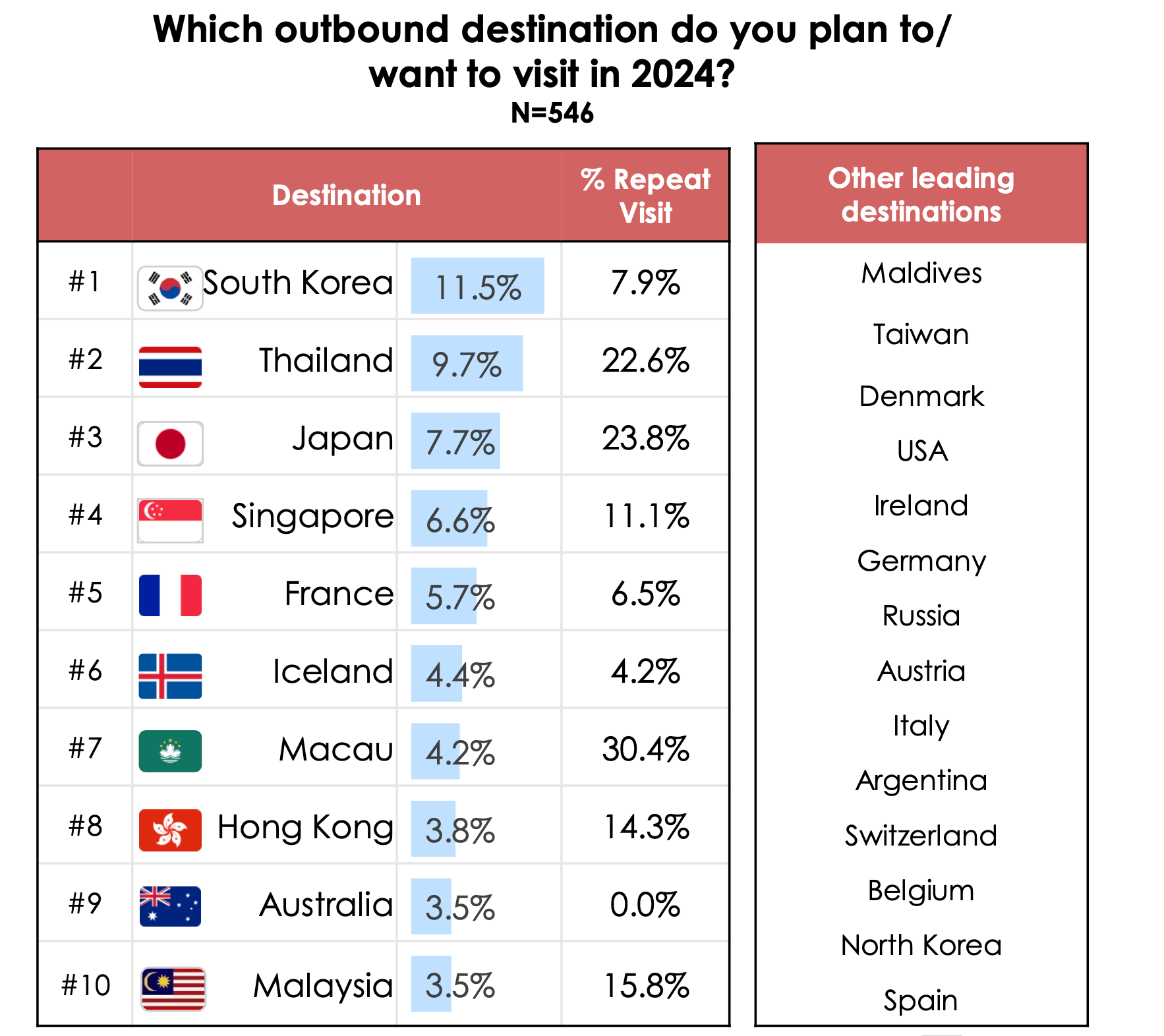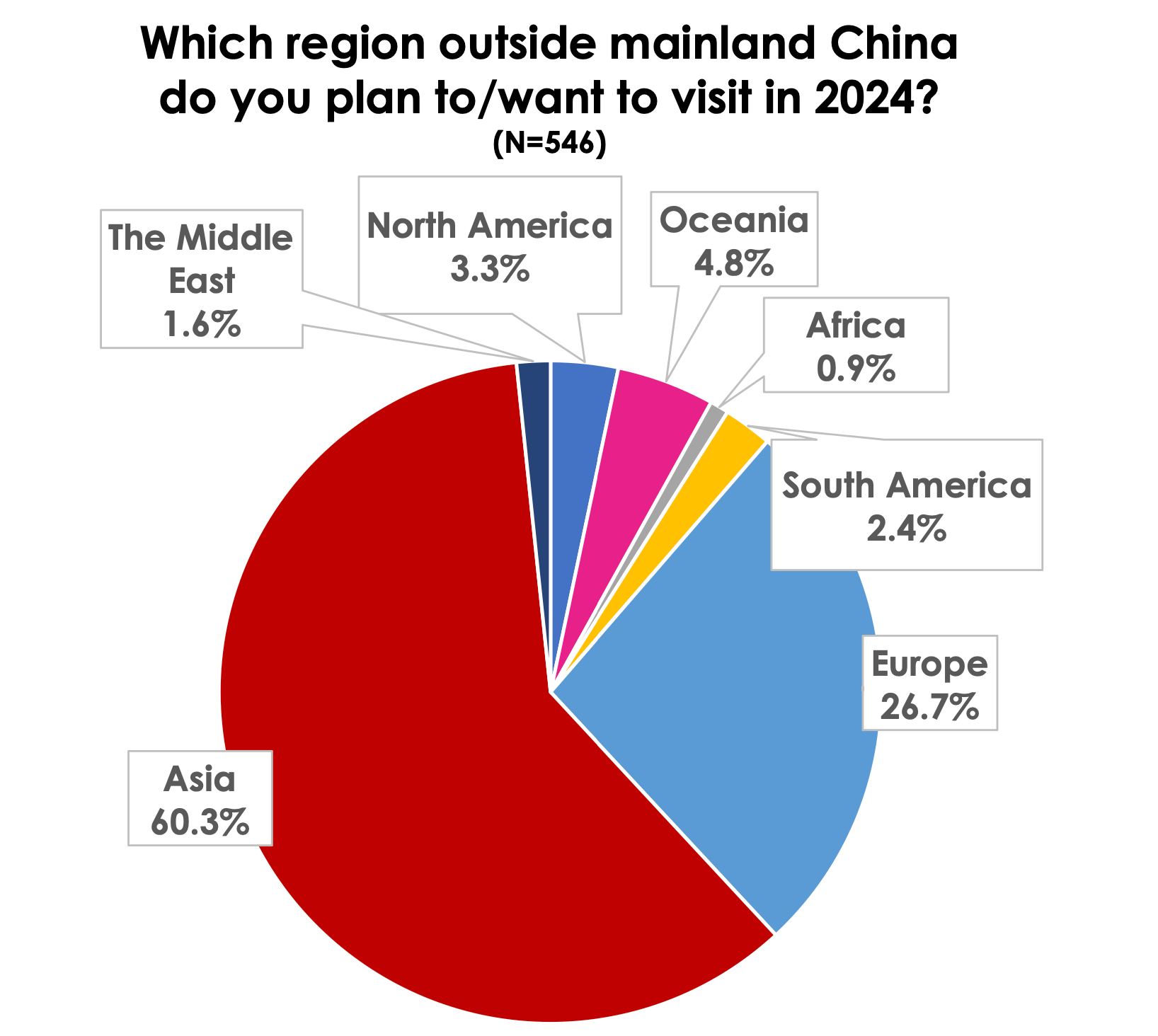China’s outbound travelers have evolved since the relaxing of travel restrictions in early 2023 – now Chinese tourists plan more, and more distant trips, driven by a desire for more exotic and relaxing experiences, according to a new survey released today.
Dragon Trail International’s latest Chinese Traveler Sentiment Report, which polled 1,015 mainland Chinese travelers from March 6 to 19 on travel intentions, motivations, and reactions to tourism marketing, found that wanderlust is officially back.
In a telling sign of China’s rebounding traveler confidence, 63% of respondents plan to embark on international travel in 2024, and 5% had already done so as of mid-March.
A further 18% had already secured bookings for outbound trips, and another 40% plan to travel internationally, though without confirmed bookings. These figures are a turnaround from last year, when only 10% of respondents had confirmed their travel plans by the same period, and 26% were still in the planning stages without bookings.
This zeal for travel this year is influenced in part by the fact that Chinese travelers perceive the world as increasingly safe. Ten out of 12 destinations were ranked as safer than last year.
Hong Kong and Singapore are seen as the safest, followed by Switzerland and Australia, while perceptions of safety in Japan were hit by the Fukushima waste water release last summer.
Among respondents who had already traveled abroad in the first quarter of 2024, the preferred destinations were a mix of traditional favorites such as South Korea and Thailand, alongside less frequented locales like Belarus and Kiribati. It was also common for many to return to previously visited spots, with destinations such as Canada, France, the UK, Singapore, and the UAE seeing repeat visits from Chinese travelers.
Among those who have secured their travel arrangements for later in 2024, 94% plan to visit multiple destinations. The majority, approximately 74%, will explore various parts of Asia, while Europe continues to draw 16% of travelers. Peak travel is set for May, July, and October, aligning with the timing of China’s “Golden Week” holidays.
While Asia continues to be the preferred region for 60.3% of the respondents planning international trips, this figure has decreased from 75% recorded in the spring of 2023.
Meanwhile, Europe has increased in popularity, with 26.7% of respondents planning to travel there in 2024, up from 15% last year. Other long-haul regions such as South America, North America, and the Middle East have also seen modest increases in interest, each growing by about one percentage point.

Confirming the findings of other recent studies, Chinese outbound tourists are attracted by culture and convenience. Nearly 37% of respondents are drawn to the unique attractions of chosen destinations, while 30.6% prioritize ease of travel.
Sampling local cuisine continues to be the favored activity for outbound trips (53.5%), followed by natural scenery (52.4%) and exploring iconic buildings and museums (41.5%).
About 34.9% of respondents aspire to immerse themselves in the local lifestyle, and 31.9% are attracted to beach and seaside destinations. Although winter sports and other outdoor adventures are popular within China, these activities still represent a niche interest among outbound travelers in 2024.
The survey found that Chinese tourists continue to be strongly influenced by social media and personal networks, with more than 25% of travelers swayed by recommendations from friends, and nearly 24% influenced by key opinion leaders and television programming.
Over half of Chinese travelers (52%) used Xiaohongshu for destination information, surpassing Douyin (43%), Ctrip (37%), Weibo (26%), and WeChat (23%), which highlights the urgent need for overseas travel brands to integrate this platform into their marketing strategies in 2024.

Chinese travelers are strongly driven by relaxation and convenience in 2024. More convenient global travel – due to more visa-free entry options, direct flight availability, and streamlined application processes – are making overseas trips easier and more accessible. Additional pull factors for choosing to travel abroad include immersion in different cultures and customs, having the financial means and time to travel, and the desire to expand their worldview.
While South Korea is the top intended destination for Chinese tourists, with 11.5% of respondents indicating plans to visit this year, Thailand and Japan follow closely behind, along with newly visa-free Singapore and Malaysia.
France remains the top draw among European destinations and number five on the list of top 10, followed closely by surprise entrant Iceland, which has gained steadily in popularity over the past year due to positive portrayals on social media and television.
Fifty-eight percent of respondents indicated that they plan their trips to ensure the best value for money, with 14% saying they prioritize the lowest-priced travel options. A smaller segment of travelers (11%) is prepared to spend more for premium products and services at any cost, with another 11% saying they’re happy to spend more for enhanced experiences.
Approximately 65% of respondents report spending a minimum of RMB 2,000 (about $276) on shopping during an individual outbound trip. The most frequently purchased items are local foods and souvenirs, respectively favored by 73% and 61% of travelers, followed by cosmetics and apparel, purchased by 37% and 33% of the respondents, respectively.
When it comes to the most engaging online video content, respondents preferred food-related subject matter, followed by scenery, culture, and “aurora” – presumably meaning the aurora borealis, a major draw for aforementioned Iceland.
These findings underline the importance of video and live-streaming content, particularly on platforms like Douyin and Xiaohongshu, for travel destinations angling to attract more Chinese travelers in 2024.
All data provided by Dragon Trail International.

